Warning: This post contains spoilers.
Westworld has spent a good chunk of time lining up some very intriguing mysteries as philosophical threads about man and machine gradually emerge. But fans finally got some answers about the ethically unsound tourist attraction during the penultimate episode. One of the biggest discoveries of “The Well-Tempered Clavier” was Arnold’s identity, which Ford revealed when he took us back to the exact moment of Bernard’s technological birth. Viewers will have to wait until the finale to see Ford’s fully realized vision for a new narrative, but here are the seven things the show made official Sunday night.
1. Bernard is definitely a simulation of Arnold.
As some fans have suspected all along, Ford reveals late in the episode that he built Bernard in Arnold’s image. It seems Arnold was the superior talent among the pair, and Bernard reiterates that his forebear had grander plans for the hosts, which likely led Ford to get rid of him. Fashioning a subservient host version of his deceased partner was Ford’s way of keeping Arnold under his thumb, because even though he had been a threat to the park’s order, his creative genius was too good to kill off for good. Ford makes it very clear that it was he who conceived of Bernard, along with the android’s cornerstone: the loss of his son Charlie—a personal touch Ford added because Arnold also suffered a tragedy, and tragic cornerstones have generally made for the park’s most lifelike androids.
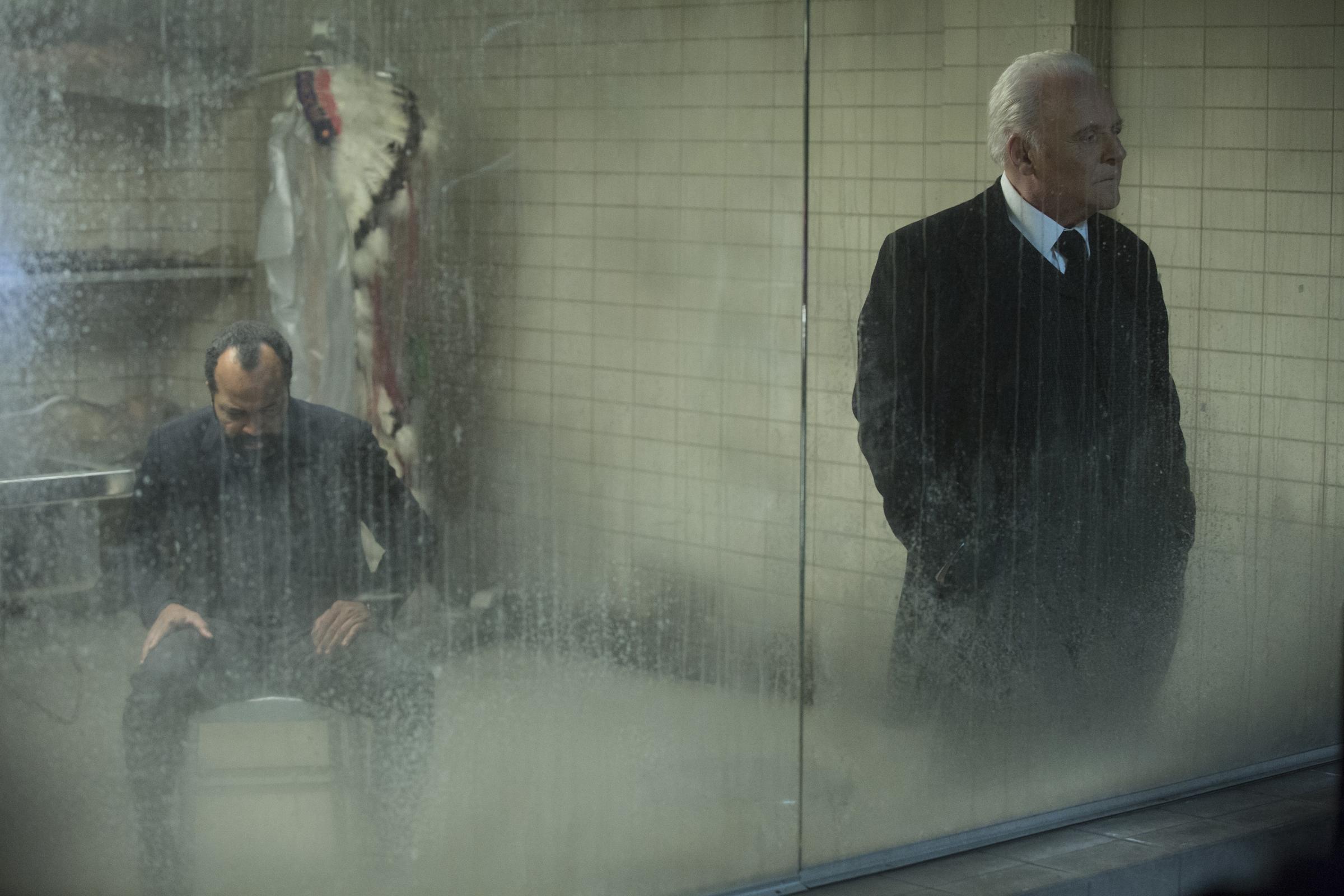
2. Bernard has taken his own “life” after becoming sentient.
After Maeve hits Bernard with the unsettling truth that he’s a host, he breaks into Ford’s office to examine the intricacies of his own code. (It’s not the first time we see him learn he’s a host, but it appears his memory has been wiped since the last time he got this crucial update.) Tellingly, he brags to Ford that his mind is split and Arnold is still an integral part of his own inner programming. With an assist from Clem, he then persuades Ford to give him an all-access pass to his own history from the beginning of his time at Westworld. As Bernard takes a tour through some distressing events, he appears to come to terms with the fact that the death of his fake son was, well, all fakery. The show has hinted that unspeakable pain might be the key to hosts’ enlightenment (as it appeared to be when the Man in Black killed Maeve’s daughter), but it could also keep them tethered to their world.
When Bernard threatens Ford with an exodus of sentient hosts, Ford doesn’t stress. After all, the hosts, along with Maeve, recognize Bernard as the very man who hurt them. Still, Ford may be foresight-impared on this front. In the end, Ford politely requests that Bernard kill himself, and he cruises off to a party, noticeably troubled.
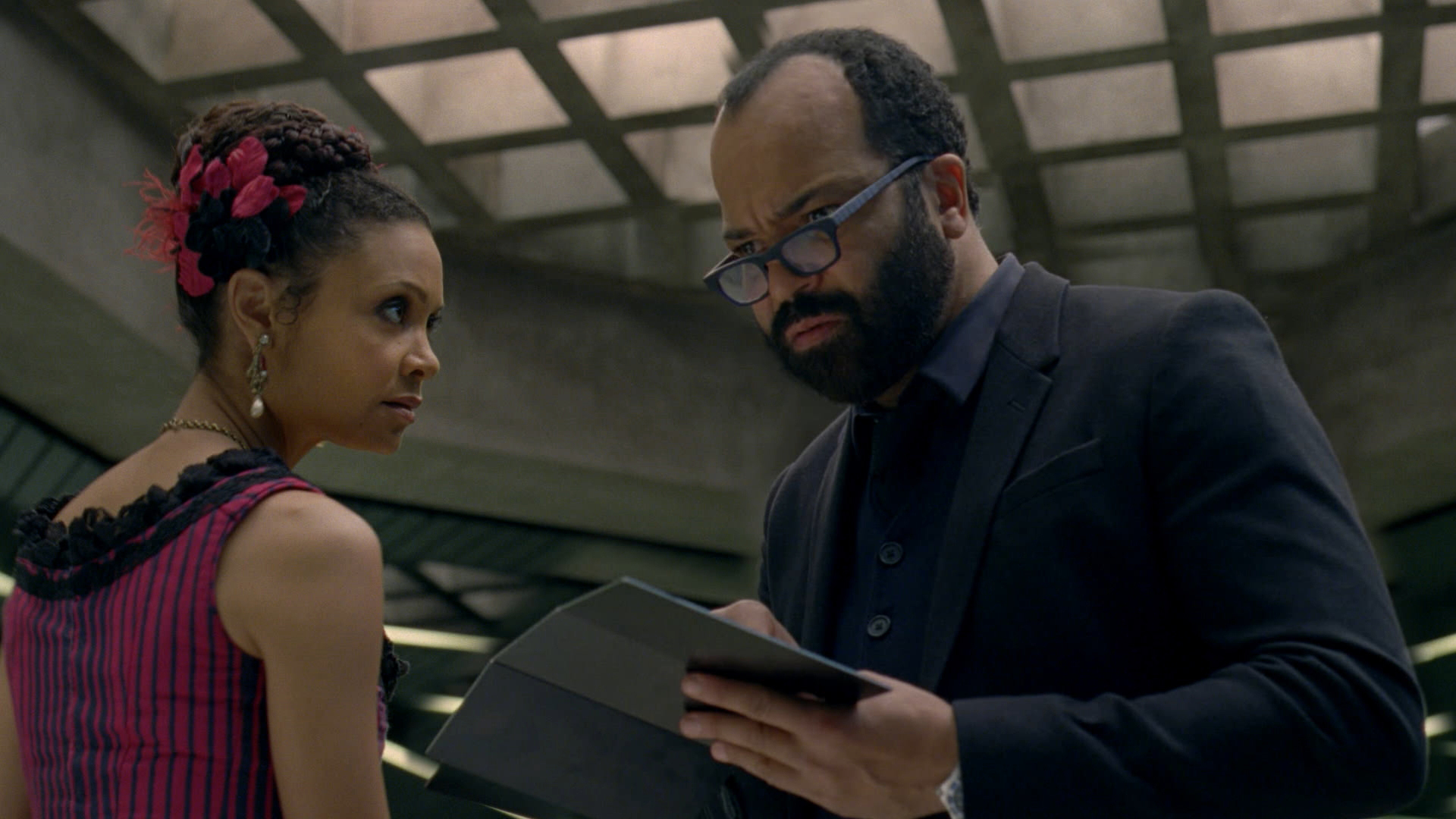
3. Maeve’s truly an ace rebel now.
Even before this episode, Maeve was already the most effective representative of the host team. Episode 9 further revealed her newfound prowess: she knows about Hector’s scar, she knows about the immediate future, she knows the safe is a metaphor for the emptiness of life in Westworld—she pretty much knows everything. Thanks to her amped-up mindpower, she can engineer the action, dictate hosts’ thoughts (even Bernard’s) and anticipate all of the narratives before they unfold. Now she has Hector on her side, although it remains to be seen if she can outwit Ford. But she’s a hundred steps ahead of everyone, and thanks to how easily she manipulated Bernard, her moves appear to be undetected so far.
Interestingly, she’s taking a somewhat revolutionary route. She’d rather empower hosts than make them all pawns in her game. While her growing power might not spell the end of the human race, it could well alter the population of Westworld as we know it. The last we see of her, she orchestrates her death yet again, by setting a tent aflame, so that she can infiltrate headquarters with Hector. But does she just want out of there? Or does she plan to exact revenge? We still don’t know if she will successfully bust herself out or try to stage a full-blown coup. Her gripes support the latter perspective.
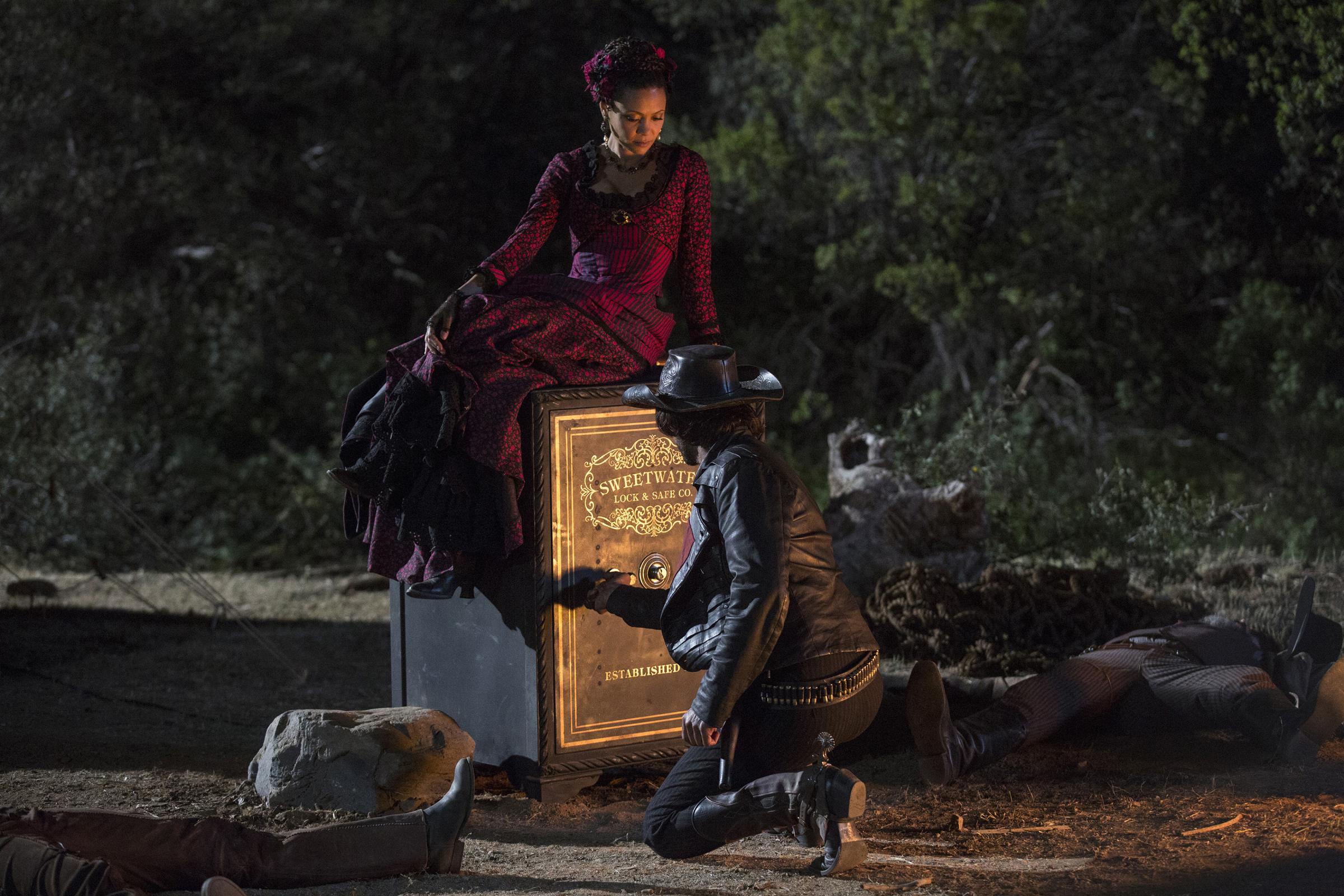
4. William is no longer Mr. Nice Guy.
Over at the Confederados‘ camp, William is finally taking “black hat” for a spin. After he tries to convince newly crowned General (or Major?) Logan that Dolores deserves human rights, Logan goes haywire. To make William remember his own backstory (i.e. reality), he knifes open Dolores’s stomach, exposing the crude, whirring gears of her hardware. He tucks a photo of his sister Juliet (William’s fiancée) in William’s jacket as a reminder of his life back home, and William convinces him they’re on the same page so they can awkwardly hug it out. Next thing we know, William gets to night-murdering all of the hosts at the camp and sets out to use Logan as his servant in the mission to free Dolores.

5. The Man in Black is a board member.
Charlotte Hale breaks the rules by showing up in the park wearing fancy heels with her stellar golf joke. She’s there to get the Man in Black’s blessing to oust Ford. He’s good with that plan of action, because it doesn’t interfere with his mission. Turns out he’s not just a shareholder—he’s a member of the board. She tells the Man in Black that Theresa suffered an accidental death, the accidental nature of which he’s not buying. He’s still in a position of power, but Hale suggests that getting his Westworld fix could be clouding his business judgment.
In the fantasy realm, Angela “kills” Teddy, whose account of the Escalante massacre differs from hers. She decides to knock the Man in Black unconscious for the night. He wakes up to find a noose around his neck, strung over a tree and tied to a horse, but because he’s such a skilled horse whisperer, he survives to continue on his path. As for that path, Angela warns that the maze isn’t for him, echoing Lawrence’s daughter. But he still feels like the maze is taking him full circle to the church, which became swallowed by sand, and presses on.
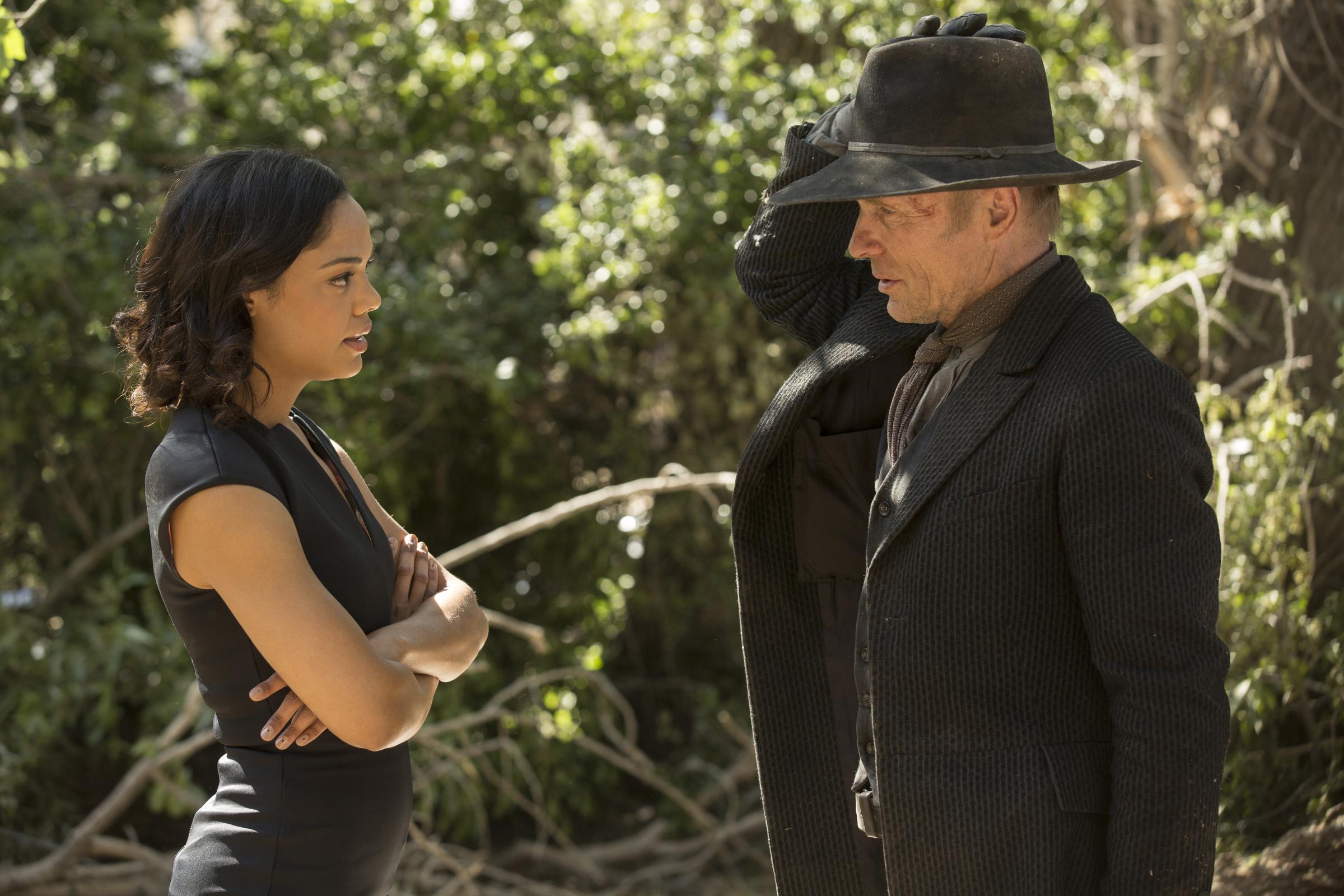
6. Elsie might still be out there somewhere.
Confirming suspicions that clever Elsie may still be in the mix, Stubbs sees a signal from her. Because we’re in Westworld, it could just as easily be fake as it could be real. It’s possible that Bernard, when he strangled her under Ford’s command, finished the job but her tablet is still sending out a signal from her lifeless hands. But Stubbs sets out to find that sleuth, anyway. And because Westworld staffers on fact-finding missions never seem to avoid trouble, he’s stopped in his tracks by masked warriors who he optimistically (and naively) addresses as “fellas”—and who don’t respond to his verbal commands. It’s more than likely that Ford directed them there so that he wouldn’t have yet another self-righteous truth-seeking duo on his hands. If Elsie’s out there, and Stubbs survives, then they’d make a pretty viable team against Ford.
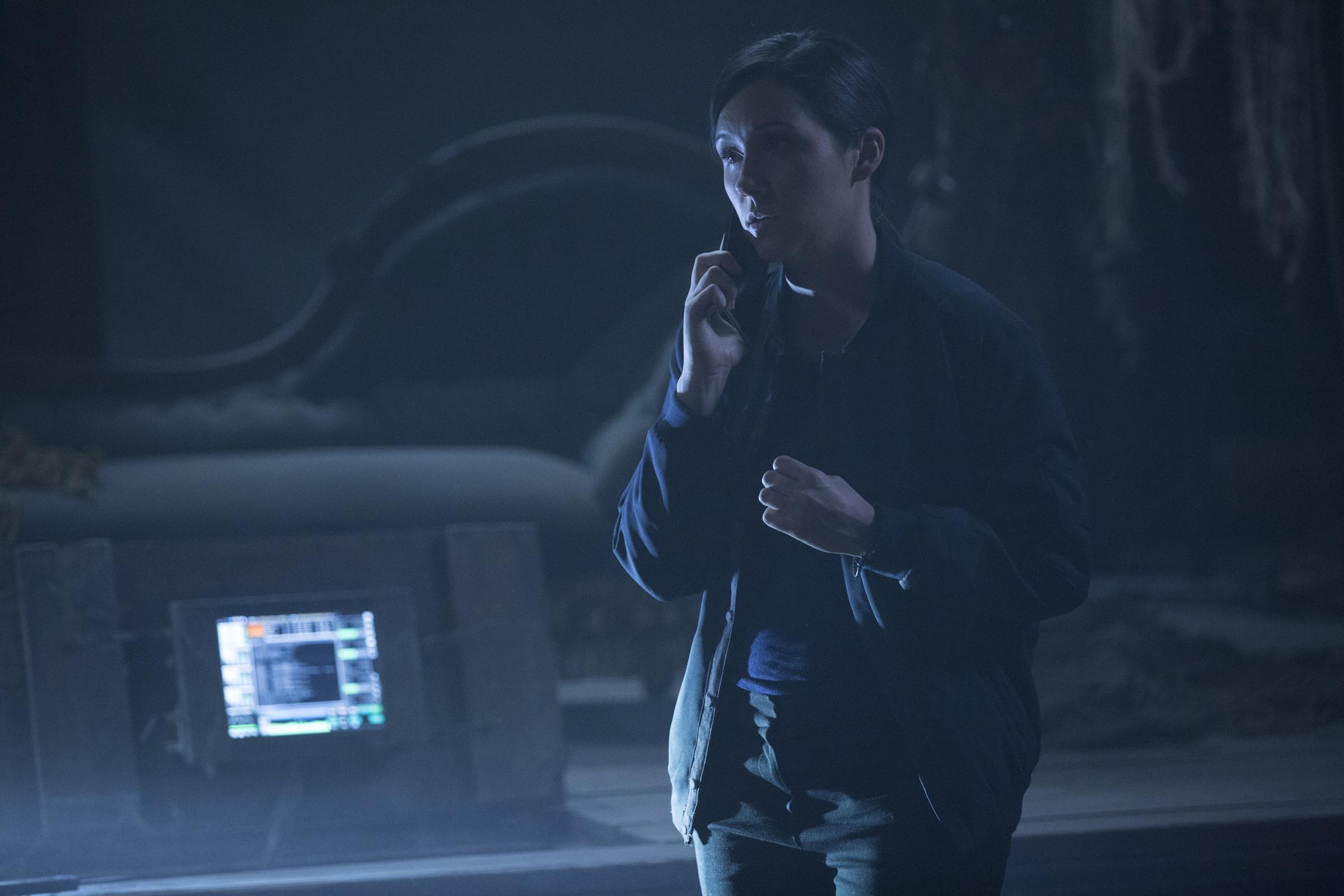
7. Dolores killed Arnold.
Dolores’ thirst to meet Arnold appears to have persisted over the years. She still believes he’s her maker, but as Bernard explains: too bad, he’s dead. Why? Dolores, of all people, killed him, and her memory of that event is foggy. It’s unclear whether she murdered Arnold because Ford told her to, or just because she snapped. In one of her memories, she descends into the old workshop via a confession booth in the church, where everyone’s losing their marbles. Once there, she sees Ford having a too-much-consciousness fit over Arnold, who according to Ford was way over the limit on creating consciousness.
She’s deep into exploring the nature of her identity, and it’s quite muddled. In her own memories, she’s a farm girl one moment, and an empowered sharpshooter the next, repeating past loops. The more she learns about both the real world and the maze, the less convinced she is that either are life-affirming for her future. At the end of the episode, she waits for William at the church, but the Man in Black (in theory, future William) shows up instead. She’s shocked, like she is about pretty much everything, but here’s hoping the finale will tie up this loose end rather than make us all wait until the second season.
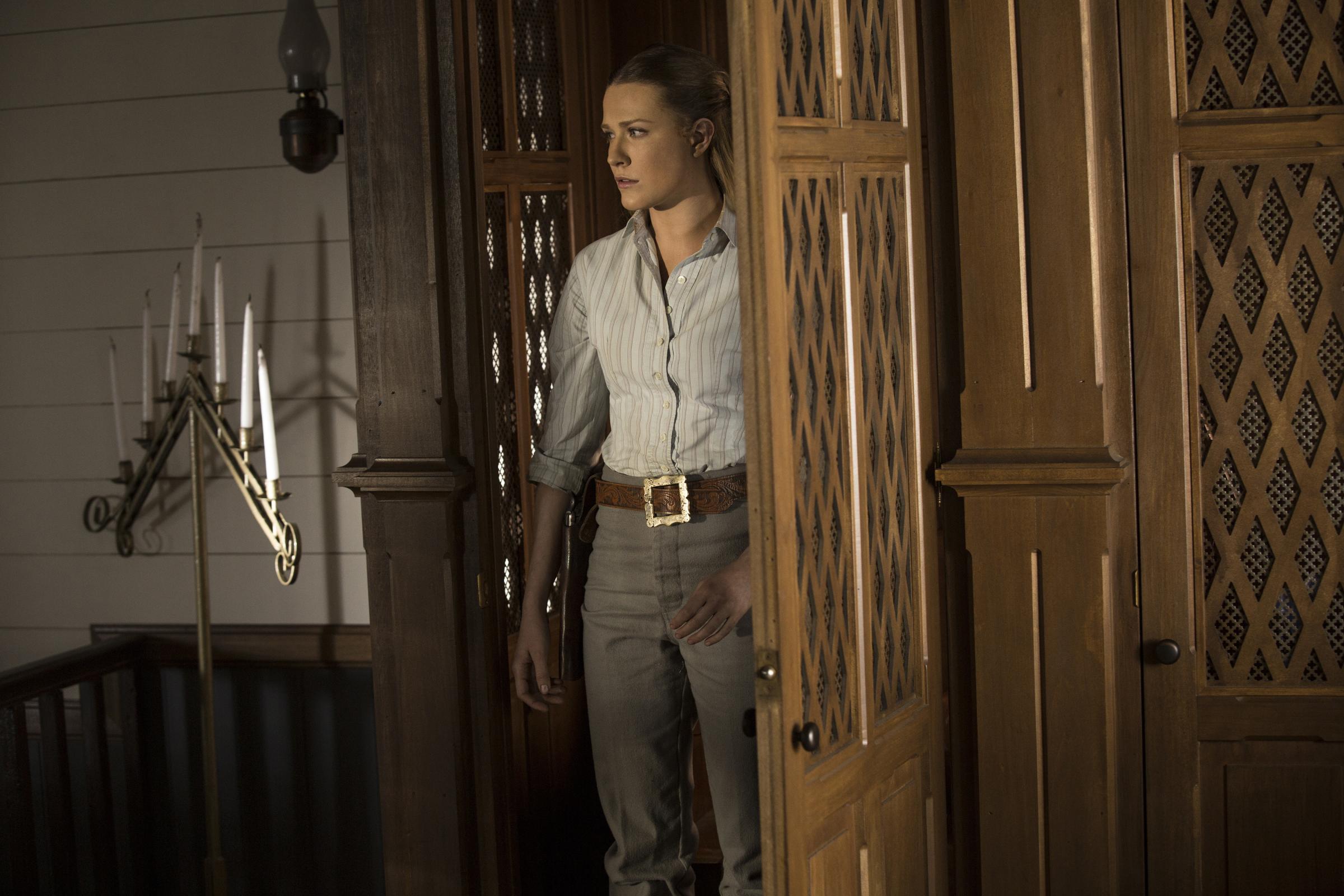
Random Observations:
Oddly enough, the photo of Juliet is the same shot the techs confiscated because it drove Peter Abernathy nuts. All of this—and especially Juliet’s name—seems to be connected. Shakespeare, and Romeo and Juliet in particular, is one of the major literary references that keep popping up in Westworld. The supposedly viral whisper that Abernathy utters to set Maeve and Dolores on the path to autonomy (“these violent delights have violent ends”) comes from Romeo and Juliet. Friar Laurence delivers it as he’s marrying the two lovers from feuding families, warning them that passion fizzles. Not only does William’s monied fiancée share the same name as the tragic heroine, but William, the infatuated Romeo, also has a trusted accomplice in Lawrence (different spelling, same idea).
A fly is relaxing on Dolores’s sleeve as William tries to persuade Logan to smuggle her out. We’re not yet sure why, or even if, the flies are important, but they seem to land on the hosts with a frequency that hints at something greater than randomness.
More Must-Reads From TIME
- The 100 Most Influential People of 2024
- The Revolution of Yulia Navalnaya
- 6 Compliments That Land Every Time
- What's the Deal With the Bitcoin Halving?
- If You're Dating Right Now , You're Brave: Column
- The AI That Could Heal a Divided Internet
- Fallout Is a Brilliant Model for the Future of Video Game Adaptations
- Want Weekly Recs on What to Watch, Read, and More? Sign Up for Worth Your Time
Contact us at letters@time.com